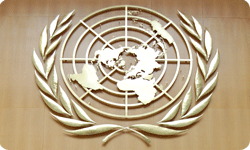Australia under review at the United Nations
 Rachel Ball
Rachel Ball
IT'S a busy time for Australia in the international human rights arena. In the coming months our performance under the two main human rights treaties will be reviewed by UN treaty bodies. The Rudd Government has also recently prepared reports on the implementation of treaties dealing with race discrimination and discrimination against women.
The review process is an important part of the international human rights system. When a country ratifies a human rights treaty, it undertakes to submit periodic reports examining its compliance with treaty obligations. The UN treaty bodies’ consideration of these reports is one of the primary ways in which implementation is monitored.
In March the Human Rights Committee will review Australia’s compliance with the International Covenant on Civil and Political Rights (ICCPR) and in May the Committee on Economic, Social and Cultural Rights will conduct a similar review of compliance with the International Covenant on Economic, Social and Cultural Rights (ICESCR). Together, these two conventions contain all of the rights set out in the Universal Declaration of Human Rights.
Late last year, the Human Rights Committee released the list of issues that it will focus on in its review. Among these are Australia’s anti-terror legislation, the disproportionate number of Indigenous Australians in conflict with the criminal justice system, violence against women, mandatory migration detention, and mental health care in prisons.
Geneva and New York-based treaty-body reviews are sometimes criticised as being process-driven exercises that have little to offer in terms of on-the-ground protection and promotion of human rights. However, they can make a significant contribution in two important respects.
First, the review process provides an opportunity for non-government organisations (NGOs) to discuss and mobilise around important human rights issues. Last year major civil society reports were prepared for both the ICCPR and ICESCR reviews. Together these reports constitute a comprehensive analysis of the state of human rights in Australia and make a range of targeted recommendations. They were endorsed, in whole or in part, by over 200 Australian NGOs, including Liberty Victoria.
Second, the Concluding Observations issued by the treaty bodies can be powerful tools in the hands of human rights advocates, particularly in the current political climate where the Government has made a public commitment to engaging with the UN and harmonising Australian law with international human rights standards.
For example, last year the Committee against Torture’s Concluding Observations included 27 recommendations about Australia’s implementation of the Convention against Torture. Since then the Government has taken steps to implement several of the most significant of these recommendations.
After a long period of disengagement, Australia is increasingly involving itself in the UN human rights system. This is a positive development that has the potential to address disadvantage and promote human dignity at home.
Rachel Ball is a committee member and a lawyer at the Human Rights Law Resource Centre (www.hrlrc.org.au).
